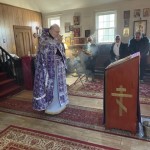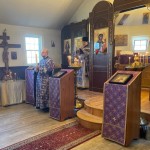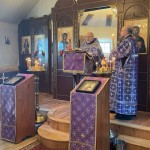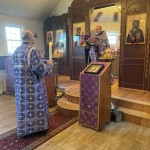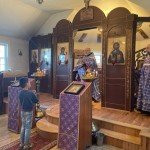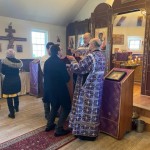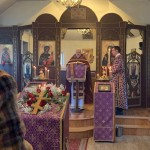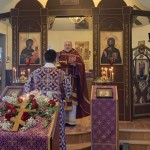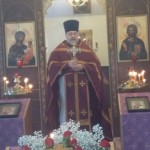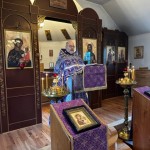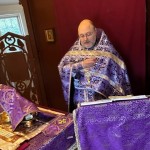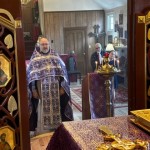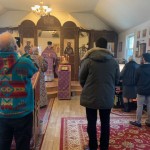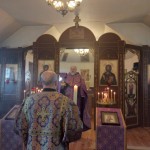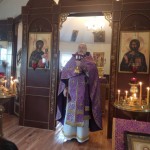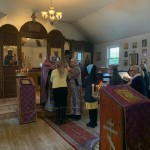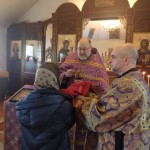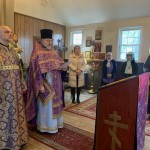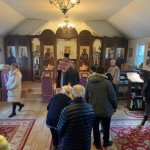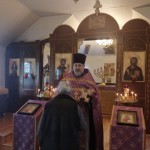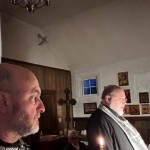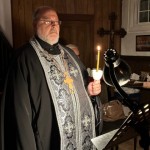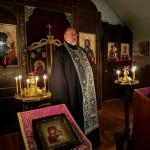On March 26, on the Fourth Sunday of Lent, Rector of St. George Church, Archpriest Igor Tarasov served the Divine Liturgy at our parish temple. After the reading from the Holy Gospel he addressed the faithful with the following homily:
“Dear brothers and sisters in Christ! Today is the 4th Sunday of Lent, and we have already made more than a half way of our journey towards the Holy Pascha. And today the Church offers us a Gospel story about casting out of an evil spirit and it also honors Venerable John of the Ladder, a holy ascetic man who wrote a book on spiritual perfection. Thus today we have to realize that there are different difficulties and dangers on our way to the Kingdom of God. Realizing them we may understand how to overcome them”.
“First of all, we have to be aware that there exists an enemy of the human race, the devil. He is tempting us and is willing to lead us away from our salvation. In today’s Gospel lesson we heard that the Lord cast out an evil spirit from some young man (Mk. 9, 17-31). Such things happen although rarely – a demon enters into a human body and tortures a man willing to destroy him. And we have to believe that it really happens because in our days many people, even those who call themselves the believers in Christ, refuse to believe in the existence of the devil and evil spirits. However, the cases of direct and physical possession by the demons are not so many. It much more often happens that the enemy is tempting us spiritually and we give in to that temptation, committing a sin and turning away from God. Such thing happened to Adam and Eve”.
“But we have already said in the past that people should not blame the devil for their sins. If we did not consent to commit a sin, the devil would never force us to do it. But he finds different ways and approaches to our heart, to our nature perverted by sin and seduces us to act sinfully”.
“We have to note that the enemy especially attacks those who is attempting to lead a spiritual life and engages in the acts of piety. Ven. John whom we honor today described spiritual perfection as a Ladder leading from earth to heaven. Today we may see the image of that Ladder in the middle of the church. Observing that icon we may see that some people pictured there are climbing the Ladder but some of them fall being snapped by the demons. Some fall being on a higher step. And we see that among them there are monks, priests and bishops. What does it mean? It means that the higher a person ascends in his spiritual life, the more he is overcome by the evil forces”.
“The destiny of Judas Iscariot is a perfect example of that. He was one of the 12 Apostles chosen by the Lord. He was close to Jesus Christ. But this could not preserve him from being tempted, and in his case the devil attained a victory. Judas was not possessed by a demon in a literal sense but Holy Evangelist Luke writes, “Satan entered Judas, surnamed Iscariot, who was numbered among the twelve. So he went his way and conferred with the chief priests and captains, how he might betray Him to them” (Lk. 22, 3-4). Thus Judas became filled with the spirit of Satan and betrayed the Son of God. This is why we have to be very careful about our thoughts and desires. Judas did not become filled with the spirit of the devil from the beginning. We read in the Gospel that he was the Apostles’ treasurer. And behold, the devil found his weakness – his love of money. Holy Evangelist John writes that Judas was a thief and he used to take from the donations given for Christ and the Apostles (Jn. 12, 6). Later this weakness and this sin made Judas mad, so he decided to betray Christ Himself for the money. Therefore, dear brothers and sisters, let us be careful with our passions!”
“Another thing that we need to understand from today’s celebration of the 4th Sunday of Lent is that we need a firm faith. In today’s Gospel we heard what the Lord said to the father of the possessed young man, “If you can believe, all things are possible to him who believes” (Mk. 9, 23). The father of the young man cried out, “Lord, I believe; help my unbelief!” (Mk. 9, 24). Our faith is weak and appears like unbelief. Therefore, we need to ask the Lord to help our unbelief. And we have to strengthen our faith by the acts of piety, by prayer and fasting”.
“In today’s Gospel story we heard that the Disciples of Christ were unable to cast out a demon. And we should note that this happened after many of them, particularly not the 12 but the 70 Apostles did cast out the evil spirits. They joyfully reported the Lord that even the demons are subject to them in the name of Christ (Lk. 10, 17). But here the Apostles failed. The Lord later explained that this kind of demons is being driven out only by prayer and fasting (Mk. 9, 29). Therefore, dear brothers and sisters, our struggle against the enemy of the human kind, our fight against him is possible only if we practice prayer and keep fast. Otherwise we are not going to overcome him as the Apostles failed to overcome him in today’s reading from the Gospel”.
“Dear brothers and sisters! Let us remember that the devil never sleeps. As Holy Apostle Peter teaches us, “Be sober, be vigilant; because your adversary the devil walks about like a roaring lion, seeking whom he may devour” (1 Peter 5, 6). But if we will have a firm faith, we will be able to overcome the intrigues of the evil one. And if we are going to live by prayer and fasting, we will be able to chase the unclean spirit from our thoughts, from our deeds and from our lives, and then we will be able to reach the Kingdom of Heaven!”
During the Litany of Fervent Supplication the Rector had a petition for the suffering country of Ukraine and its people. He also added a commemoration of the “suffering Ukrainian land” at the Great Entrance.
The choir director prayerfully performed hymns dedicated to Venerable John Climacus during preparation for Holy Communion.
After the dismissal the Rector made some announcements regarding the April schedule in our church and encouraged the parishioners to attend special services that are going to be held in that month.

